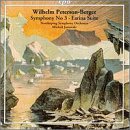A New Northern Light
Dr. Patrick D. Enright | Tahlequah, OK, USA | 09/06/2002
(5 out of 5 stars)
"Cast your mind back to how you felt upon first listening to any of Sibelius's more "Northern" works--En Saga or Symphony No. 4, for instance--and you'll have an idea of the wonderful sense of discovery waiting for you in Peterson-Berger's Third. This is not to say that P-B was copying Sibelius, for he has his own voice, I believe, within the late Romantic idiom, but they both share a love for the starkness of the sublime, a love they both communicate superbly through their music. The other two pieces on this disc, though overshadowed by the impact of the symphony, would by themselves make the CD worth buying. What more can one say, other than to hope that cpo continues to record the rest of P-B's works?"
An Evocation of the Northern Lights
Thomas F. Bertonneau | Oswego, NY United States | 10/22/2000
(5 out of 5 stars)
"An opera, "Arnljot," propelled Vilhelm Peterson-Berger (1867-1942) into national prominence in 1909 and holds the stage - only in Sweden, of course - to this day. Every educated Swede knows its Act I tenor aria for the eponymous hero, "Alltjämt de mäktiga fjäll sig välva" ("Eternally do the mighty mountains tower"). Peterson-Berger, a Wagnerian, a Nietzschean, a Neo-Romantic of the hyperbolic disposition, loved the rugged nature of Sweden, and celebrated it inveterately not only in his music-dramas but in his orchestral music as well, including his five symphonies. The best known of these, the Third (1915), in F-Major, explores the extreme North of Sweden, the area within the Arctic Circle populated by the Lapps and called, in the Lapp tongue, "Same Ätnam," from which stems the travelogue-title of the symphony. (The composer was born in remote Ångermanland, in the North of Sweden, the true "Land of the Midnight Sun.") The Lapps practice a tradition of improvisatory vocalise, "Joiking," and Peterson-Berger incorporates a number of "Joik" melodies in his score. American listeners will likely remain unaware of what to Swedes seems a quaint form of exoticism, the equivalent of Edwardian British interest in Hebridean folksong or of Ernest Bloch's interest in Dakota-Sioux war-chants. Which is not to chide this fine, late-Romantic symphony in distinctly Nordic accents for any faults; it is, in fact, a superb example of Peterson-Berger's considerable art. The First Movement (Allegro Moderato), called "Forntidsbilder" ("Images of the Past"), begins mysteriously over a rhythm curiously like those that turn up in Bloch's "American Indian" moments; lovely lyrical episodes follow, as well as mountainous climaxes. The Second Movement (Moderato), bears the description "Vinterkväll" ("Winter's Eve") and makes reference, via the harp and plucked strings, to the glittering of the Northern Lights; it is both a nocturne and a scherzo (note the Mahlerian horn-tune in the Trio), finely spun, delicate, and swift. The slow Third Movement (Tranquillo) takes us from one season to another, from winter to summer ("Sommarnatt" ["Summer Night"]): The form is fugal, the sense of stillness and solitude is deeply felt. To paint effective tone-pictures with academic devices, like fugue, indeed marks a superior artist. The composer dubs the Finale (Moderato) "Åkerfälten i Degerfors" ("The Farmland in Degerfors"): The human presence at last dominates, taking wild nature under the plow and forcing the staff of life, by sweat, from the stony earth. Here the ethos of folksong - not only the "Joik," but of the Swedish "folkvisa" as well - is most noticeable. No wonder that this symphony still draws audiences in Sweden! The "Earina Suite" refers (via the Greek) to spring, the most magical time for Scandinavians, after the long winter. The music is sunny and tuneful. The brief "Chorale and Fugue" comes from the opera "Domesdagprofeterna" ("The Doomsday prophets"), a comedy from 1917. Peterson-Berger is at least as good as "minor" Russians like Glazunov and Glière and deserves wider recognition than he probably currently enjoys. This disc should go a long way towards fostering it. Michail Jurowksi's performance with the Norrköping Symphony Orchestra is clear and full-blooded."


 Track Listings (10) - Disc #1
Track Listings (10) - Disc #1